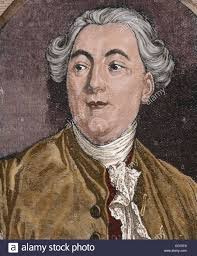|
The Letters on Sympathy were published in 1798 as an appendix to Sophie de Grouchy's translation of the final edition of The Theory of Moral Sentiments and of On the Origins of Language. However, we have good evidence that the Letters on Sympathy were drafted earlier, in 1792 as she sent copies of them to her friend Etienne Dumont in the spring 1792, and her husband, Nicolas de Condorcet refers to them in his 1793 ‘Advice to his Daughter’. These may, however have been early drafts, and it is likely that Grouchy would have wanted to revise them somewhat before publication six years later. But did the Letters exist even before hand? Pierre Louis Roederer, idelogue and member of Grouchy's circle after the Revolution notes, in his Memoirs and in a review of the Letters published on 14 July 1798, the existence of an earlier manuscript which he had seen in the hands of Sieyes in 1789 or 1790. Although it's possible that a draft existed then, the fact that Roederer himself cannot remember the exact date (1789, or 1790?), that his testimony occurs nine years after the fact (and they were a busy nine years!) and that we have a dated letter from Grouchy to Dumont about her writing the manuscript, 1792 is a more reliable date. Roederer, although he mostly praises the Letters in his review does have some criticism. She ought not, he says, to have addressed the Letters to Condorcet and taken the tone of an instructor, as Condorcet would already have known and understood everything she could possibly write! (But in fact, we have good reasons to think that the C*** of the Letters was Cabanis, not Condorcet). On the other hand, Roederer does not accept another criticism, namely that Grouchy's style lacks the gracefulness of a woman's writing or the authority of a man's. Her style, he says, is adapted to her subject. He points out that sentiment and frivolity is not conducive to a clear discussion of thorny subjects. Madame du Chatelet, he adds, did not write her Physics using the stylistic 'tricks' of Madame de Sévigné, and Sévigné herself did not use these 'tricks' when she wrote about human understanding and moral sentiments. He concludes that Grouchy's style, although not always 'pure' is clear, simple and without pretensions.
In a 1790 text addressed to Necker, when he is about to leave France to go into exile, Olympe de Gouges announces that she too is ready to leave France. She has done her best, but that was not enough, and she now has too many enemies to stay safely. But her message is also to the French: unless you change your way fast, she says, you will lose your revolution, and your liberty, and you will find that you are better off with a king. She goes on to tell him the following story: a coach driver insulted a national guard. When Olympe challenged him, he said that the national guards treat people like him badly, that they don't pay, and that he and his family are starving despite his work. He concludes: I were a good democrat when the Revolution started, because I thought I would get something out of it. But now, I'm aristocratic as a dog Olympe reflects sadly on this state of things, and judges that democracy has not yet taken hold in the French and that they may not be ready for it: The counter-revolution will happen by itself, through the force of nature, especially if the French go another six months at this present rate. Things are destroyed, nothing is built. Everyone wants to be in charge, no-one wants to obey. All is reduced to nothing, everything is in a terrible disorder. The love of liberty still turns French heads, but once it is gone, they will recognize, I hope, that one master is better for them, than all men being masters at once. |
About
This is where I live blog about my new book project, an intellectual biography of three French Revolutionary women philosophers. Categories
All
Archives
November 2022
|



 RSS Feed
RSS Feed